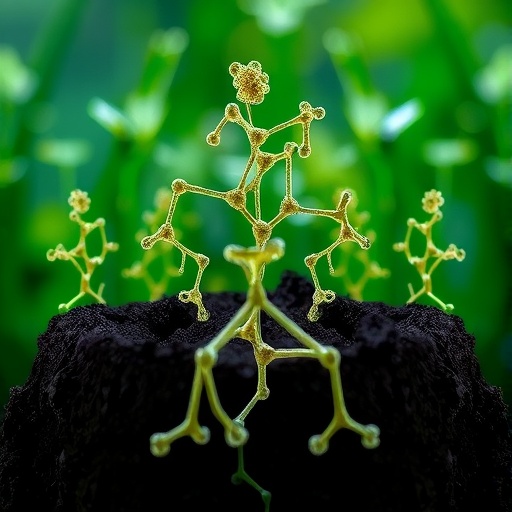In a groundbreaking study published in Environmental Science and Pollution Research, researchers have illuminated the vital role of soil bacteria in mitigating the detrimental effects of petroleum contamination. The analysis of bacterial communities in petroleum-affected soils provided insightful information that led to the identification and isolation of specific bacterial strains capable of degrading hydrocarbons. This discovery not only enhances our understanding of microbiological degradation processes but also sets the stage for innovative bioremediation approaches in environmental management.
Petroleum contamination is a pervasive issue affecting ecosystems worldwide. Traditional remediation techniques, such as physical and chemical methods, are often costly and can pose further risks to the environment. Consequently, there is a growing interest in bioremediation, which harnesses the natural metabolic capabilities of microbial communities to break down pollutants. The current research effectively demonstrates how deepening our understanding of bacterial interactions within these communities can lead to the development of more effective bioremediation strategies.
The initial phase of the study involved sampling soil from various locations heavily contaminated with petroleum products. By employing advanced molecular techniques, the researchers analyzed the microbial diversity present in these samples, paying particular attention to the abundance and variety of bacteria. The results were striking; certain bacterial taxa were found to significantly dominate the communities in heavily polluted sites, revealing their potential role in bioremediation processes.
Following the identification of these key bacterial species, the researchers proceeded to isolate several strains that exhibited notable hydrocarbon-degrading capabilities. Among these, a few were particularly proficient at breaking down a range of petroleum compounds, including aliphatic and aromatic hydrocarbons. This capacity for versatility makes these bacteria prime candidates for future bioremediation applications, as they can potentially address different types of petroleum spills encountered in various environmental contexts.
The study utilized a combination of cultivation-based methods and modern sequencing technologies to uncover the genetic tools utilized by these bacteria in degrading hydrocarbons. By examining the metabolic pathways that these bacteria employ, the researchers were able to characterize their enzymatic capabilities. Understanding these pathways is crucial for developing bioremediation strategies, as it provides insights into how these microorganisms can be optimized for field applications.
An interesting aspect of this research is the potential for synergistic interactions among different bacterial species within the soil ecosystem. The study indicates that when various bacterial strains are combined, their collective ability to degrade hydrocarbons can be significantly enhanced. This finding suggests that cultivating a diverse microbial community for bioremediation may yield better results than relying on single strains. Such insights could inform the design of microbial consortia tailored for specific remediation scenarios.
The application of the findings from this study extends beyond laboratory settings. The researchers highlighted the potential for in situ bioremediation strategies that could be implemented directly in contaminated environments. By inoculating affected soils with the identified hydrocarbon-degrading bacteria, or even stimulating the native microbial populations through targeted nutrient additions, it may be possible to accelerate the degradation process, leading to more rapid recovery of contaminated sites.
Moreover, as the global demand for sustainable practices increases, the implications of this research resonate across various sectors. Bioremediation represents a green approach to managing petroleum pollution, reducing reliance on harmful chemicals while promoting the natural recovery processes of ecosystems. As the understanding of soil microbial communities deepens, the potential applications for these natural solutions expand, opening doors to innovative environmental management practices.
The collaboration among researchers from various institutions is notable in this study, reflecting a multi-disciplinary approach to addressing environmental challenges. By integrating microbiology, ecology, and environmental science, the team has set a precedent for how collaborative efforts can lead to impactful discoveries. Such teamwork is essential in tackling the complex issues surrounding petroleum contamination and fostering a sustainable future.
In conclusion, this research not only provides significant insights into petroleum degradation by soil bacteria but also emphasizes the importance of understanding microbial ecology in environmental management. As humanity continues to grapple with pollution, the need for effective, sustainable solutions becomes increasingly urgent. This study reinforces the potential for bioremediation as a viable strategy, encouraging further exploration and application of microbial solutions to restore polluted environments.
By revealing the intricate relationships among soil bacteria and their mechanisms for breaking down petroleum, this research lays the groundwork for future advancements in bioremediation technologies. As more studies follow in its wake, the hope remains that these discoveries will lead to systematic changes in how we manage contaminated sites, fostering healthier ecosystems for generations to come.
The study stands as a testament to the power of microbial life in the fight against pollution and highlights the promising future of bioremediation in addressing critical environmental challenges.
Subject of Research: Bioremediation of Petroleum-Contaminated Soil Using Soil Bacterial Communities
Article Title: Soil bacterial community analysis guides the isolation of petroleum-degrading bacteria and potential application for the bioremediation of petroleum-contaminated soil.
Article References:
Huo, K., Sun, Z., Zhao, L. et al. Soil bacterial community analysis guides the isolation of petroleum-degrading bacteria and potential application for the bioremediation of petroleum-contaminated soil.
Environ Sci Pollut Res (2025). https://doi.org/10.1007/s11356-025-37242-1
Image Credits: AI Generated
DOI: https://doi.org/10.1007/s11356-025-37242-1
Keywords: Bioremediation, Petroleum Degradation, Soil Microbiology, Hydrocarbon-degrading Bacteria, Microbial Ecology




